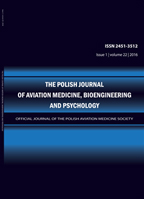2014, Volume 20, Issue 4
Hypoxia and Cognitive Performance
Piotr Zieliński1, Robert Drozdowski2, Marcin Biernacki1
-------------------------------------------------------------------------------------------------
1Department of Psychology, Military Institute of Aviation Medicine
2Department of Internal Disease, Military Institute of Aviation Medicine
Autor korenspondencyjny: Marcin Biernacki; Department of Psychology, Military Institute of Aviation Medicine; email: mpbiernacki[at]gmail.com
Full text
Streszczenie
Introduction: The study investigated short-term eff ects of hypoxia on higher cognitive functions.
Methods: Stroop test (classic and Reverse Stroop task) was chosen as the assessment tool. The sample consisted of 29 paratroopers (males, mean age 33.97). They were subjected to hypoxia at a simulated altitude of 7500 meters during altitude training in a hypobaric chamber. Time of Useful Consciousness (TUC) for every subject was recorded. Each subject performed the Stroop test prior to entering the hypobaric chamber and about 30 minutes after hypoxia exposure.
Results: Although reaction times were signifi cantly faster during posttest, the interference susceptibility in Reverse Stroop task increased (t(28) = 2.16, p < 0.05, Cohen’s d = 0.41). While controlling for baseline performance, the increase of susceptibility positively correlated with TUC (r(25) = 0.37).
Discussion: The results are of academic and practical importance.
Conclusions: Results suggest that short, non-life-threatening hypoxia could aff ect higher cognitive functions even after exposure. The magnitude of this eff ect is associated with the time of oxygen shortage even among persons whose individual TUC was not exceeded.
Słowa kluczowe
cognitive functions, hypobaric chamber, hypoxia, pilots, Stroop test
